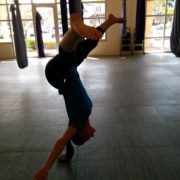Can Stimulating the Prefrontal Cortex Calm the Default Human Survival Flight/Fight Response?
When humans encounter situations that they perceive as threatening, the parts of the brain responsible for our survival (i.e., amygdala, hippocampus) kick in to determine if running away from the threat is possible, to fight if not, and if neither is possible to stand still, hold our breath to be quiet and ultimately faint. This flight/fight/freeze/faint response is not only the default position of our brains, it can be so activated over time from trauma and stress that it stays turned on even when we are not in harm’s way.
As someone that grew up in a home that would now be described as chaotic, I found myself in a series of situations that I either ran away from or fought, with a few where I found myself frozen in fear. As a young child we don’t understand how these experiences are effecting our development, we just do what we have to – anything to survive. As a young adult, I began to sense the amount of pressure I held in my body and used that energy to drive myself forward, sometimes to the point of exhaustion.
Through several years of psychotherapy, I discovered that the survival response in my brain, when activated (which happened to be most of the time), reduced my access to the parts of my brain that helped me to focus and communicate. I subsequently learned that this is referred to as ‘amygdala hijacking’ and I describe it as the amygdala literally turning off the light switch leaving it in the dark to fend for itself without being able to see that there is access to support, specifically the prefrontal cortex. And when you can’t access this part of the brain on a consistent basis, it loses its ability to offer a more balanced perspective of life. Remember that saying “If you don’t use it, you lose it”, well it applies here too.
When I discovered yoga, I found a way to keep these two parts of my brain connected and when I did, it reduced the level of anxiety in the moment and began to strengthen the bridge that allows space to response, instead of react. One of the most powerful tools that I learned from my time on the yoga mat was deep belly breathing, which was the first tool that I took off of the mat and into my everyday experiences.
Research has shown that practicing such breath techniques has neurophysiological impacts through respiratory vagus nerve stimulation. The vagus nerve is the main part of our parasympathetic autonomic nervous system that is responsible for rest and digest processes and when stimulated is closely associated with emotional balance, mental flexibility, empathy and attachment. It does this through decreasing hippocampal activity among other things, reducing the reactivity in the fear center of our brain, making access to the prefrontal cortex easier. Now, what I have to admit is that I practiced such breath techniques for years until I began to consistently experience the emotional balance I so craved. So, from personal experience I know it works, yet it can take time.
So how excited was I when I read the recent research in the Journal of the American Medical Association (JAMA) Psychiatry that looked at this bridge from a different perspective – stimulating the prefrontal cortex in order to allow it to stay online and calm the fear center of the brain when experiencing threatening circumstances, reducing anxiety. This research looked at the effects of transcranial direct current stimulation, such as used in direct neurofeedback, of the prefrontal cortex on amygdala threat activity in people who experience chronic anxiety. Neuroimaging was used to assess the impact and the results reveal a direct connection between the ability of the prefrontal cortex to regulate the fear response in the amygdala. These findings offer more support to the neurocognitive mechanism contributing to the positive effects of direct neurofeedback and offer much hope to more directly and quickly reduce anxiety through such a non-pharmaceutical treatment option.












Leave a Reply
Want to join the discussion?Feel free to contribute!